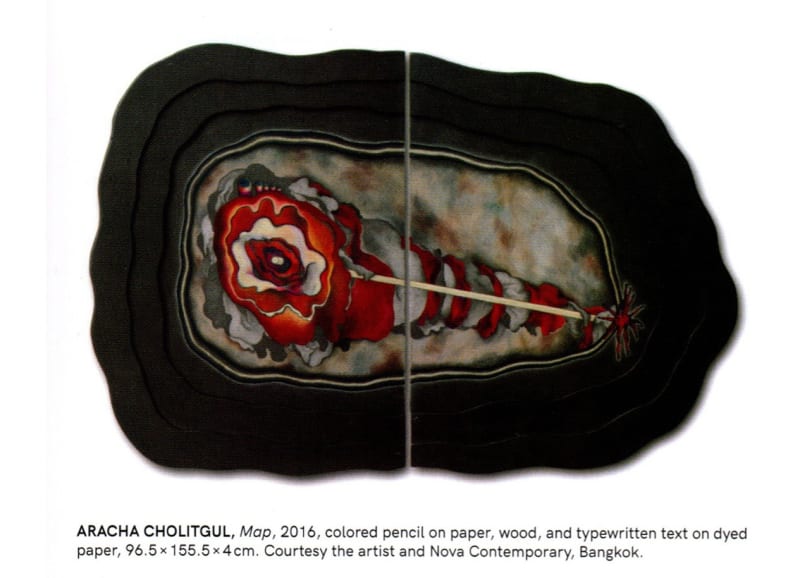Of the 11 million bits of data that our senses gather every second, we only process 40-50 bits consciously. How might we engage the vast volumes of information that get buried simply because our brains don't know what to do with them? For Bangkok-based artist Aracha Cholitgul, "Surrealism feels like the landscape of the subconscious mind. It gives me a space to see things that I don't fully understand."
Her feverish paintings, drawings, and installations draw viewers into mysterious episodes based on her experiences. For instance, visitors to the "Museum of the Swamp of Eels" (2018), her first solo exhibition at Bangkok's Nova Contemporary, encountered mixed-media paintings inspired by her three years in Pattaya's small town of Nong Pla Lai. Parading as an informational diagram, Map (2016) depicts a vertical white line representing the town's main thoroughfare; a trail of red and ash-gray blobs lead to five toes protruding from a bloody mass in the northwestern corner. Aracha's memories of injuring her leg and being robbed on a secret path off Nong Pla Lai's main road tumble into the smoke-shrouded landscape where residents habitually burn trash, reflecting the discombobulation with which we experience the world, and the muddiness of our memories.
While in Nong Pla Lai, Aracha worked as a manager for the Thaillywood Artist Residency. The housekeeper she befriended there got a tattoo from a monk that would supposedly help her win the lottery. Curious about what goes on in people's heads because of their hopes and desires, Aracha created five mixed-media works that riff off the tattoo's abstract, tree-like form. Trunk, Roots, Leaves, Flower, and Fruit (all 2019) collectively conjure a glowing money tree, and the mindscape of the hopeful housekeeper.
The artist's forthcoming animation will likewise probe the pockets of the mind, especially those that hold unprocessed thoughts and feelings. "It's about looking at your mental health or the things you don't want to see in health check-ups," Aracha said. "I see the similarity in feces and emotional issues--it's something that was once good, and when it turns bad, you have to find a way to get it out of your system."


